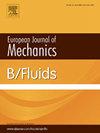温度依赖粘度对含重力微生物的Jeffrey流体在可渗透介质中热生物对流的影响
IF 2.5
3区 工程技术
Q2 MECHANICS
引用次数: 0
摘要
本研究探讨了温度依赖性粘度的线性和指数变化如何影响存在于可渗透介质中的重力微生物的非牛顿杰弗里流体中热生物对流流动的启动,这在现有文献中尚未得到解决。考虑边界处不存在微生物通量,通过线性稳定性理论确定热生物对流的阈值,并利用伽辽金方法解析求解相应的特征值问题。结果表明,当粘度随温度呈线性变化时,系统开始对流的临界瑞利数rd,cEx比粘度随温度呈指数变化时高约11%。这表明,当粘度随温度呈指数变化时,与线性变化相比,系统更不稳定。随着生物瑞利-达西数rbd、生物psm - clet数peb、Jeffrey因子γ和粘度偏差参数f的增大,排列的稳定性降低。在粘度随温度呈指数变化的情况下,对流单元的尺寸随着粘度偏差参数f的增大而增大,而在粘度线性变化的情况下,对流单元的尺寸保持不变。此外,重要的是要强调振荡对流运动与当前的分析无关。本文章由计算机程序翻译,如有差异,请以英文原文为准。
Impact of temperature dependent viscosity on thermo-bioconvective flow of Jeffrey fluid containing gravitactic microorganism in a permeable medium
This study investigates how linear and exponential variations in temperature-dependent viscosity influence the initiation of thermo-bioconvective flow in a non-Newtonian Jeffrey fluid with gravitactic microorganisms present in a permeable medium, which has not been addressed in the existing literature. The threshold of the thermo-bioconvective flow, taking into account the absence of microorganism flux at the boundaries, is determined through linear stability theory, and the corresponding eigenvalue problem is resolved analytically using the Galerkin method. The findings indicate that when viscosity changes linearly with temperature, the critical Rayleigh number at which the system starts convection is approximately 11 % higher than when viscosity changes exponentially with temperature. This shows that the system is more unstable when viscosity changes exponentially with temperature compared to a linear change. The stability of the arrangement decreases as the bio Rayleigh-Darcy number, the bio Péclet number, the Jeffrey factor, and the viscosity deviation parameter increase. In instances of exponential viscosity variation with temperature, the size of the convective cells grows with the viscosity deviation parameter, while it remains constant in the case of linear viscosity variation. Additionally, it is important to emphasize that oscillatory convective motion is not relevant to the current analysis.
求助全文
通过发布文献求助,成功后即可免费获取论文全文。
去求助
来源期刊
CiteScore
5.90
自引率
3.80%
发文量
127
审稿时长
58 days
期刊介绍:
The European Journal of Mechanics - B/Fluids publishes papers in all fields of fluid mechanics. Although investigations in well-established areas are within the scope of the journal, recent developments and innovative ideas are particularly welcome. Theoretical, computational and experimental papers are equally welcome. Mathematical methods, be they deterministic or stochastic, analytical or numerical, will be accepted provided they serve to clarify some identifiable problems in fluid mechanics, and provided the significance of results is explained. Similarly, experimental papers must add physical insight in to the understanding of fluid mechanics.

 求助内容:
求助内容: 应助结果提醒方式:
应助结果提醒方式:


